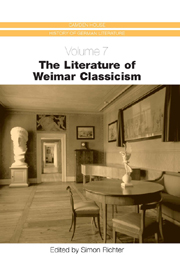Book contents
- Frontmatter
- Contents
- List of Illustrations
- Preface and Acknowledgments
- Conventions, Editions, and Abbreviations
- Introduction
- What is Classicism?
- Antiquity and Weimar Classicism
- The Correspondents' Noncorrespondence: Goethe, Schiller and the Briefwechsel
- Johann Gottfried Herder: The Weimar Classic Back of the (City)Church
- Drama and Theatrical Practice in Weimar Classicism
- German Classical Poetry
- The Novel in Weimar Classicism: Symbolic Form and Symbolic Pregnance
- German Women Writers and Classicism
- Weimar Classicism as Visual Culture
- The Irrelevance of Aesthetics and the De-Theorizing of the Self in “Classical” Weimar
- Goethe's “Classical” Science
- The Political Context of Weimar Classicism
- Bibliography
- Notes on the Contributors
- Index
Drama and Theatrical Practice in Weimar Classicism
Published online by Cambridge University Press: 05 February 2013
- Frontmatter
- Contents
- List of Illustrations
- Preface and Acknowledgments
- Conventions, Editions, and Abbreviations
- Introduction
- What is Classicism?
- Antiquity and Weimar Classicism
- The Correspondents' Noncorrespondence: Goethe, Schiller and the Briefwechsel
- Johann Gottfried Herder: The Weimar Classic Back of the (City)Church
- Drama and Theatrical Practice in Weimar Classicism
- German Classical Poetry
- The Novel in Weimar Classicism: Symbolic Form and Symbolic Pregnance
- German Women Writers and Classicism
- Weimar Classicism as Visual Culture
- The Irrelevance of Aesthetics and the De-Theorizing of the Self in “Classical” Weimar
- Goethe's “Classical” Science
- The Political Context of Weimar Classicism
- Bibliography
- Notes on the Contributors
- Index
Summary
For most of the nineteenth and twentieth centuries the dramas of “Goetheundschiller” stood for Weimar Classicism. The major plays of this touching amalgam of Germany's greatest playwrights were understood to embody the bourgeois ideology of Humanität and Bildung, which married Schiller's Kantianism to the new classicism brought by Goethe from Italy. The resulting modified neoclassicism, synthesized from the French and English (particularly Shakespearean) dramatic traditions, undergirds modern German literature and identity. The assertions implicit in this summary are largely true. Nevertheless, the common view overlooks a crucial point: Goethe and Schiller sought to educate the German public not through drama, but through the theater. As official director of the Weimar Court Theater from 1789 until 1817, Goethe hired and trained the company, oversaw the repertory, adapted important texts (the less important ones were usually adapted by his eventual brother-in-law Christian August Vulpius [1762–1827]), and personally directed numerous plays. After 1797 Schiller shared in many of these duties. In order to read the drama of German Classicism as a specifically historical rather than ideological phenomenon, this chapter begins with the Weimar stage and its repertory under Goethe's direction; against this background a more nuanced understanding of the ambition and achievement of German classical drama, first as a whole and then as the work of individuals, emerges.
The Weimar Stage
In the eighteenth century Germany alone in Western Europe lacked a deeply rooted theater — national or otherwise. Court drama with lavish spectacle had spread from sixteenth-century Italy to England, France, and Spain; in the course of the seventeenth century all developed flourishing commercial theaters for both spoken drama and opera.
- Type
- Chapter
- Information
- The Literature of Weimar Classicism , pp. 133 - 168Publisher: Boydell & BrewerPrint publication year: 2005



